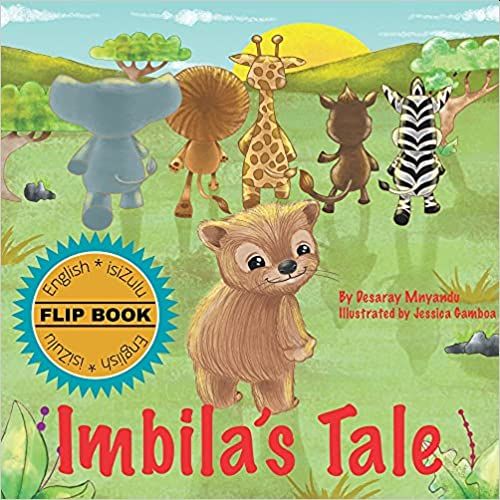Imbila’s Tale (Umbila Nomsila Wakhe)
 Imbila's Tale
Imbila's Tale
Picture Book / South Africa / bi-lingual / Zulu
June 10, 2021

"All the animals on the savanna are excited to finally get a tail. Imbila (hyrax) is excited too! Read as this adorable, and sometimes mischievous little creature tries to get a tail without leaving the comfort of his warm rock." Publisher
African folktales like other folktales are didactic. They teach the reader an obvious truth. Desaray Mnyandu has created a bilingual example of a pourquoi Zulu folktale.
An imbila wants a tail as do the other animals. As these animals pass by enroute to the creator to obtain their tail, Imbila asks each one to collect an extra for him. He sees no point in going and standing in line when one of the other animals could do so for him. As it turns out, the “Creator” customizes tails and won’t make one without seeing the owner. In the end, the “Creator” runs out of tails. It is clear to Imbila and the reader, that if you want something done correctly, you must do it yourself and happiness comes from one’s uniqueness.
Although the illustrations do not given any information concerning wild animals in South Africa, they highlight the process through the story. By doing so, children listening can repeat the common phrases three times and understand the significance of the story. There is a balance between genders with two male animal characters and two female and one of the most powerful animals, the elephant, is female. We only see the hands of the Creator but the pronoun tells us that he is masculine. This comports with the Zulu conception of God known as Unkulunkulu.
Older children would like the challenge of reading the Zulu and matching words. It could be a small group project to identify words as one might do as an anthropologist. The author’s note provides questions to further engage “little readers” and we learn that Imbila is the Zulu word for the hyrax (also known as dassies). It would have been useful to learn a bit about the Zulu people.
Patricia Kuntz, Ph.D.
Published in Africa Access Review (February 24, 2022)
Copyright 2022 Africa Access
